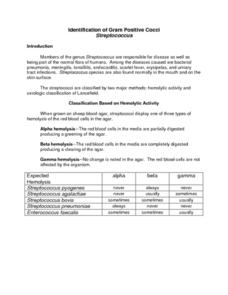Curated OER
Name that animal
A great way to classify organisms, is by counting the number of legs it has or how it moves. Little ones count the legs on five different creatures, then match the leg count to the proper animal name. Tip: Have them come up with other...
Curated OER
How Can Plants Be Grouped?
In this plant classification worksheet, students compare plants with flowers and plants with cones by filling in the blank of 7 statements.
Casimir Middle School
Biological Classification Worksheet
Classify living things with a set of worksheets that has pupils sorting and indentifying living and non-living things. Learners use the worksheets as a basis for finding their answers.
Curated OER
Classification of Organisms
In this classification instructional activity, students solve 3 classification riddles, complete 6 true and false questions, complete 4 sequences, and solve a riddle about the classification of an animal.
Curated OER
Classifying Life
In this classifying life worksheet, students review the 5 kingdoms of organisms by completing 10 matching and 7 fill in the blank questions.
University of Hawaiʻi
Taxonomy and Me!
Taxonomy is the study of organisms and how you phylum. Three biology activities are included, helping scholars understand four of the six kingdoms, specifically Protista, Plantae, Fungi, and Animalia. Scholars observe and classify...
Curated OER
Classifying Critters
In this classifying critters worksheet, students read a 1 page article on classifying living organisms and then answer 10 true or false, short answer, multiple choice or fill in the blank questions.
Curated OER
How Can Plants Be Sorted?
In this plant classification worksheet, students will observe a variety of different plants and categorize each plant by its flowers, leaves, and spines. This worksheet had 13 fill in the blank questions.
Curated OER
The Plant Food Factory
Plants need sun and water to survive. Let kids discover these facts by reading a block of informational text and considering a scientific quandary. They read the text, then use the information to complete a two-part question about plant...
Curated OER
Distinguishing Between Flowers
A branching key is a great way to classify different types of animals and plants! Fifth graders answer several yes/no answers about three different plants. They then create their own key to differentiate between an iris, a rose, and a...
Curated OER
Science – How Living Things are Grouped
In this classification of living things instructional activity, students respond to 7 short answer, 10 true or false, 4 multiple choice, and 4 graphic organizer questions regarding how living things are grouped.
Curated OER
Modern Classification
In this modern classification worksheet, 9th graders describe ways scientists determine an organism's phylogeny. Then they explain what the animal and fungi kingdoms have in common and how they differ. Students also classify some cells...
Curated OER
Classification of Life
In this classification of life worksheet, students use an on line source to answer questions about how species are classified, named and grouped. They give the classification of a bear, an orchid and a sea cucumber.
Curated OER
Classifying Living Things
In this classification worksheet, students read a description of how all living things are related and describe a diagram showing how this taxonomy works. Students answer five questions related to their reading.
Curated OER
Mini-Ponds
In this mini pond worksheet, students create a mini-pond ecosystem with soil, water, and plant life. Students let their ecosystem sit for a day and they observe a sample the next day. Students identify all the pond water microorganisms...
Curated OER
Biodiversity
In this biodiversity learning exercise, learners sort and classify animals by their observable features using a dichotomous key. Students then respond to questions about complete and incomplete metamorphosis.
Curated OER
All About Seeds!
How do fruits relate to flowers and seeds? Identify the seeds and their purpose with a coloring activity for kindergartners. Once they color the seeds of apples, bananas, and peas (among others), kids get hands-on experience with bean...
Curated OER
Fungi - Review and Reinforce
Diagrams of possible fungi life cycles are printed on the worksheet for biology pupils to evaluate. Short-answer questions ask them to explain what a fungus is, how it obtains food, and what would happen if they ceased to exist. The...
Curated OER
The Origin of Life
In this origin of life worksheet, students write answers to five questions. They describe characteristics of the first life forms and how scientists believe oxygen accumulated in the Earth's atmosphere.
Curated OER
What Is Life?
In this life characteristics worksheet, students answer 16 questions about living things, Redi's experiment, basic needs, growth and development.
Curated OER
The Formation of Coal
In this coal formation worksheet, students read and informational sheet about coal formation. Students are given 5 short-answer questions regarding what they've read.
National Institute of Open Schooling
Biomolecules
An informative lesson has learners read about, discuss, and study the classification, structure and importance of the following biomolecules: carbohydrates, proteins, lipids, nucleic acids, and enzymes.
Curated OER
Identification of Positive Streptococci
After being introduced to the genus Straptococcus, biology buffs set up agar plates, esculin slants, and salt broth tubes with different species to test. The level of laboratory skills required to perform this activity makes it most...
Curated OER
Drugs and Safety Precautions
Drugs can both help and harm depending on how they are used. Fifth graders complete a worksheet that provides background information on prescription drugs. They read the text and then describe why medication manufacturers label pill...























